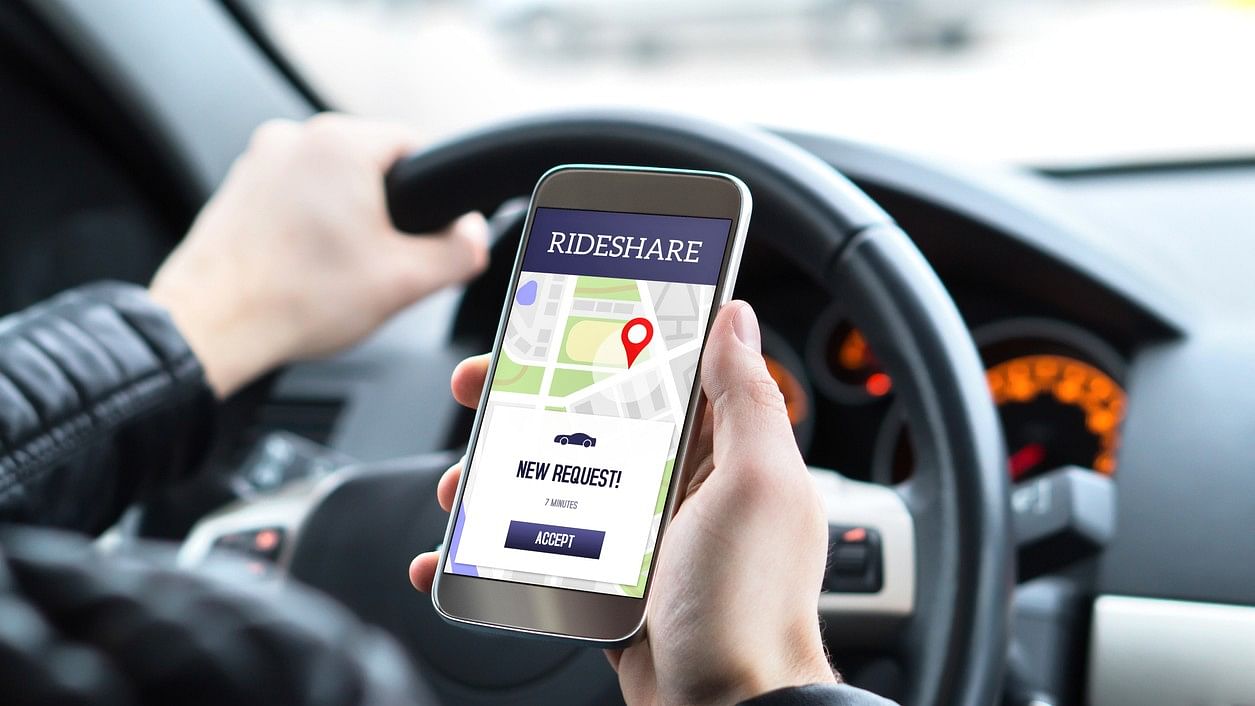
Representative image of carpooling.
iStock Photo
On August 21, the Federation of Karnataka State Private Transport Association, a group of various transport associations in Karnataka, submitted a request to Chief Minister Siddaramaiah with demands that will help boost the private transport sector hit by losses post-Covid.
Among them were two demands: Punish the companies operating white-board (personal use, non-transport) vehicles for rentals and regulate the online aggregators collecting more than 5% commission.
A week ago, media reports quoted a Karnataka State Transport Department official saying that usage of aggregator apps to pool cars might attract fines of Rs 5,000-10,000 and suspension of Registration Certificates. The apps were seen as violators that aggregated private cars, while rules allow only yellow-board vehicles to be used by aggregators.
Bengaluru has many intracity and intercity carpooling aggregators that allow people to connect with whiteboard car owners who do not have commercial permits. The news immediately started a debate. This brings the question: What are the rules for carpooling in Bengaluru or other parts of India?
The Motor Vehicle Aggregators Guidelines, 2020, allow the aggregation of non-transport vehicles by aggregators.
In furtherance of the central and state government’s objective of reduction in traffic congestion and automobile pollution and effective asset utilisation, non-transport vehicle pooling may be provided by Aggregator unless prohibited by the state government. The rationale for such prohibition shall be specified in writing and accessible on the transport portal of the state government, according to the guidelines.
Commissions causing concern
The government and the officials agree that carpooling is a good concept. However, in the absence of clarity for white-board vehicles, they seem concerned about the aggregators’ commissions.
“Even in the case of aggregators like Ola and Uber, taxi drivers do not get their rightful share,” says Ramalinga Reddy, state transport minister. He adds that in a bill that he checked, out of the Rs 800 charged, Rs 350 was taken by a ride aggregator.
“In principle, we are not against carpooling or aggregators charging a platform fee, but they should not be allowed to make profits using white-board non-transport (personal) vehicles,” reiterates Reddy. He adds that the officials will study the central government guidelines and devise a solution by next weekend.
K N M Rao, founder of Quick Ride, one of the marketplaces for carpooling, says: “Section 67-3(c) of the Motor Vehicles (Amendment) Act 2019 allows the government to issue guidelines to reduce traffic congestion. We are requesting the government to issue the guidelines under this for carpooling services.”
He says his company is the carpooling market leader in the city and has more than 50,000 active intracity office-going users per month. “Unlike ride-sharing aggregation, carpooling is a marketplace where we connect the users to matching options,” he says. Like Ola and Uber, Quick Ride also has a taxi service section which operates under an aggregator licence.
‘Support carpooling’
Raghu Ramanujam, founder of PoolCircle, the first carpooling service in Bengaluru, says he genuinely believed pooling cars was the best commute method. “PoolCircle ran between 2013 and 2016. The awareness about carpooling was much lower back then. Ola and Uber were well-funded and aggressive with their low-pricing strategies and acquisitions. It was difficult for us to scale up, get funding and expand,” he explains the reasons behind PoolCircle’s closure.
“By the time we shut down in 2017, Ola and Uber had raised their prices, and carpooling became more viable. In 2020, Covid hit the carpooling market hard as people were not going to offices,” he recalls.
“With the offices opening up, now is the window for the government to relook at the policy and encourage this positive behaviour. I would love to see this succeed,” he adds.
“Monetisation is essential. Without financial incentives, nobody is going to do this. I don’t think it can be counted as profit. Some form of regulated commercial arrangement is needed. The government should consider regulating it rather than a blanket ban,”
he says.
‘Ride-sharing rules are also ambiguous’
Ravi Gadepalli, a Bengaluru-based independent mobility expert, says even ride-sharing has issues to be addressed. “The problem is, can you share a ride in a commercial transport vehicle? We have stage carriage and contract carriage permits for buses, which allow vehicles to operate with many stops, pick-ups and drops, and point-to-point, respectively. However, the rules for shared taxis are ambiguous,” he says.
“Shared taxis will not meet the on-demand mobility needs of many people as dropping and picking up several passengers becomes a circuitous trip often, and the whole point of taking a taxi fails,” he says.
“Commercial shared rides are provided in peak hours, competing with public transport. This is why the government does not want to allow shared services. Companies that provide on-demand transport services must operate point-to-point as a premium service, not like public transport. This is the basic conflict,” he explains.
“There is now adequate literature globally to establish that on-demand shared transport services are adding to congestion, not reducing it, due to waiting and parking on busy roads and the empty trips made to pick up passengers. They are worse than personal transport,” he says, indicating that allowing rideshare services is a bad idea.
He says companies claim to provide services like corporate transport or carpooling to offices, but there is no data to back the claims. “Data and insights generated by aggregators can be used by transportation authorities to make informed decisions about their regulations. But none of the companies operating in India share the data,” says Gadepalli.
“The city provides infrastructure like parking, roads and others for taxis. So the city should get a share of the revenue generated from aggregation,” he adds.
With inputs from Muthi-ur-Rahman Siddiqui